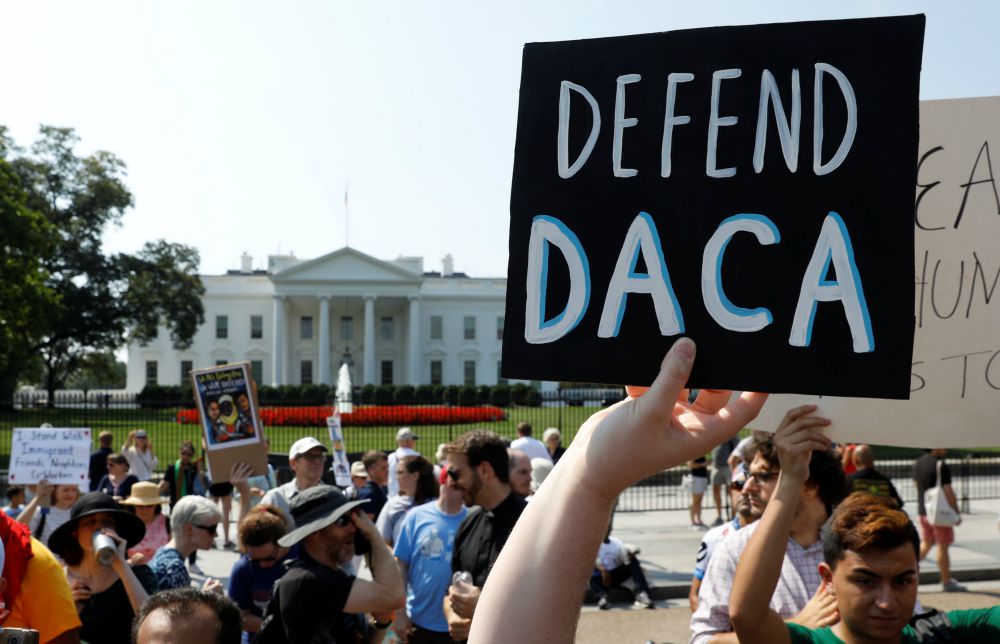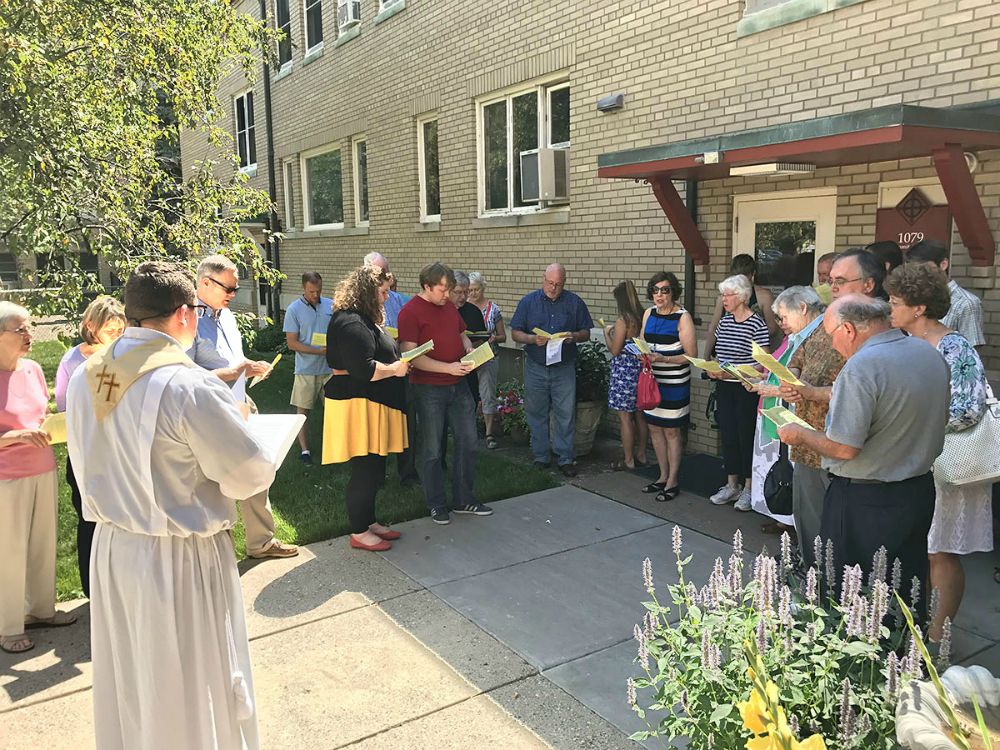
Deferred Action for Childhood Arrivals supporters demonstrate near the White House in Washington Sept. 5. (CNS/Kevin Lamarque, Reuters)
A handful of Catholic parishes and institutions across the country are offering sanctuary to immigrants threatened with deportation.
They include two parishes in Minnesota, as well as a retreat center near Las Cruces, New Mexico, whose director says it is offering "Franciscan hospitality" to an undocumented Colombian immigrant and his 15-year-old son.
Many immigrants threatened with deportation by U.S. policies are Catholic. Still the vast majority of churches offering them sanctuary in response has been limited to mainstream Protestant congregations. Some Catholic bishops have discouraged the sanctuary initiative, stating the church has no legal authority to protect immigrants and that it cannot promise safety to immigrants seeking refuge.
There is no legal exemption for churches in immigration law, but Immigration and Customs Enforcement (ICE) agents have generally left church property alone while pursuing immigrants in the United States. Between Feb. 1 and July 31, 2017, orders of removal and voluntary departures of "illegal aliens" have increased 30.9 percent over the same time period in 2016, according to the Department of Justice.
"We did it not to make a political statement," Jesuit Fr. Warren Sazama, pastor of Saint Thomas More Catholic Community in St. Paul, Minnesota, told NCR. It is a statement of faith, he said, to provide shelter to people who need it.
Sazama said his parish, located in a neighborhood with many professionals and few immigrants, forged a consensus that providing sanctuary is a necessary religious response to the anguish felt by threatened immigrants. Relying on both church and biblical teaching, many in the parish asked, "How can we be Christians and not do this?"
Earlier in the year, the parish hosted a family from Mozambique who were homeless for a few days. That family had legal authorization to stay in the country.
The parish continues to have families referred to them from local sources in the Twin Cities. Volunteer lawyers from the parish have also assisted other immigrants facing legal challenges. Sazama said that Archbishop Bernard Hebda of Minneapolis has left the decision to provide assistance in the parish's hands.*

Jesuit Fr. R.J. (Richard John) Fichtinger, associate pastor of Saint Thomas More Catholic Community, prays with parishioners. (Courtesy of Saint Thomas More)
Across the state near the South Dakota border, parishioners at St. Mary's Catholic Church in Worthington have provided support for undocumented immigrants facing deportation. They have provided homes for 15 families.
St. Mary's, a part of the Winona Diocese, has 13,000 parishioners representing 63 different nationalities, many from Latin America and Africa. The town has experienced immigration issues before. Back in 2006, an ICE raid at a local meat packing plant sent panic through the immigrant community. Some children came home from school only to find that their parents were in custody.
"The whole city was in chaos," said Fr. Jim Callahan, pastor.
The election of President Donald Trump precipitated another outbreak of fear. Parishioners met, and St. Mary's was declared a sanctuary parish. People seeking refuge are living with volunteer families; if it was necessary to protect them, said Callahan, he would open the church property to them as well.
Advertisement
A story on the church's stance on sanctuary was in the local newspaper. Some parishioners have objected, but the majority are supportive, said Callahan. Immigrants in the community, he said, "know we are doing all that is possible to try and protect them."
He said the parish has the support of Bishop John Quinn of Winona, the local ordinary. The parish has also organized efforts to defend Deferred Action for Childhood Arrivals (DACA), a policy that includes many young people in Worthington, which became an immigrant magnet for work opportunities in the local meatpacking and farm industries.
Franciscan Conventual Fr. Tom Smith, director of the Holy Cross Retreat House near Las Cruces, New Mexico, told NCR his facility has offered housing and support for Colombian immigrant Jorge Taborba and his 15-year-old son since May. The elder Taborba has been issued a deportation order.
Smith prefers to call what the retreat house is doing as "Franciscan hospitality" rather than sanctuary. He has been clear with Taborba that the retreat house has no authority to resist a legal order seeking his arrest.
The retreat house has ample room to host, with its guestrooms on 60 acres, said Smith. They received Taborba after ICE officials came to his house to detain him back in May. He was with his son at a local hospital, where the boy, a U.S. citizen, was receiving therapy. Taborba then sought refuge at his parish, Our Lady of Health, and was offered hospitality at the retreat center.
But his wife, Elena Benita Castano, was home when ICE came and was taken into custody; she was deported in June. An older son was released under the provisions of DACA.
Taborba entered the U.S. 19 years ago and overstayed a visa. He unsuccessfully sought refugee status, citing the political violence in his homeland at the time. After he was denied, he was issued a deportation order. A former Spanish teacher in Colombia, he works as a computer technician.
Taborba chose to stay at the retreat facility, said Smith, and he made a public announcement of his presence so that the church could not be accused of hiding him.
Offering hospitality to undocumented immigrants is "part of our charism and part of our lives," said Smith, citing the example of the Gospels and St. Francis of Assisi. Taborba has served as a Red Cross volunteer and takes in computer work from customers at the retreat house. He assists in chores around the facility.
Smith said that Bishop Oscar Cantu of Las Cruces is supporting the retreat center's decision.
Still, other bishops have cautioned against sanctuary, including Cardinal Donald Wuerl of Washington.
In March, he told the Washington Post that while the church supports immigrants, "When we use the word sanctuary, we have to be very careful that we're not holding out false hope. We wouldn't want to say, 'Stay here, we'll protect you.' "
Jesuit Fr. Bryan Pham, a canon and civil lawyer and professor at Loyola Marymount University in Los Angeles, said parishes and other Catholic institutions should be aware of the consequences of providing sanctuary.
"It's a prophetic stance," he said, "but there's no legal defense."
Authorities are under no legal obligation to stay away from church property while enforcing immigration law, he said.
"My main concern is to do what we can provide," Pham said, noting that the promise of legal protection on church grounds for undocumented immigrants cannot be sustained if the government were to change its procedures and be willing to go into church properties while enforcing immigration law.
"It is really bad PR for the government, but they could do it," he said.
He said parishes and church institutions offering sanctuary should define exactly what they are providing. "They have to spell it out so as to not create a false impression," he said.
Church authorities cannot legally promise to resist legitimate warrants. And they need to be prepared to be challenged on health code and other grounds if they provide shelter in areas deemed inhospitable to residential life. They also could be held liable under anti-human trafficking statutes.
He suggests that, to be clear, churches offering sanctuary should spell out how long they can be used as a haven and if they are willing to provide legal help for threatened undocumented immigrants.
Though there formerly was a provision in canon law for sanctuary, it no longer exists. It was taken out because the church recognizes that the concept could not be sustained in countries like the United States, where there is a separation of church and state, said Pham.
* Editor's note: This story has been updated and clarified with new information.
[Peter Feuerherd is a correspondent for NCR's Field Hospital series on parish life and is a professor of journalism at St. John's University, New York.]
We can send you an email every time The Field Hospital is posted. Go to this page and follow directions: Email newsletter sign-up.








